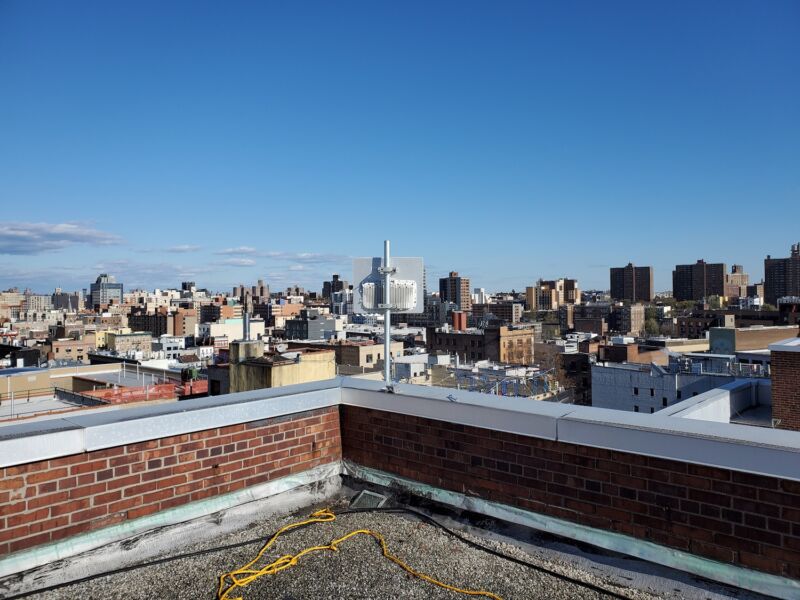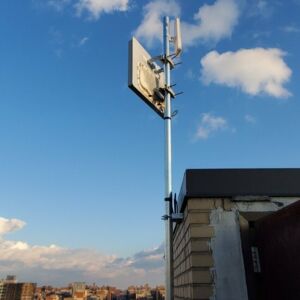
Charter Communications employees who have been on strike since 2017 are building an Internet service provider in New York City called “People’s Choice.”
“People’s Choice Communications is an employee-owned social enterprise launched by members of IBEW Local #3 to bridge the digital divide and help our neighbors get connected to the Internet during the COVID-19 pandemic,” the ISP’s website says. “We are the workers who built a large part of New York City’s Internet infrastructure in the first place. We built out [Charter] Spectrum’s cable system, until in 2017, the company pushed us out on strike by taking away our healthcare, retirement, and other benefits. It’s now the longest strike in US history.”
So far, People’s Choice says it has completed rooftop antenna installations at two schools in the Bronx and installed “hardline connections to wireless access points connecting 121 units” at housing for survivors of domestic violence who have disabilities.
A Gizmodo article said the system is equipped to offer minimum speeds of 25Mbps downstream and 3Mbps upstream, meeting a broadband standard that has been used by the Federal Communications Commission since 2015. “We have a big portion of most of the Bronx covered with our antenna,” IBEW Local #3 steward Troy Walcott told Gizmodo. “Now we have to go building by building to let people know we’re out there and start turning them on.”
“A few dozen Spectrum strikers have been actively involved in the installations, but Walcott expects that at least one hundred workers are waiting in the wings for the project to scale up,” the Gizmodo article said.
Filling broadband gaps
People interested in bringing broadband to their building can fill out a form. “We work in affordable housing, supportive housing, co-op housing, NYCHA [NYC Housing Authority], homeless shelters, and regular old apartment complexes,” the webpage notes.

“After we build out a network in your building, it transfers to cooperative ownership, so profits are returned to users,” the People’s Choice website says. “We are able to provide high-speed service in most cases for $10-$20/month. No more cable company ripping you off, and as an owner, you have a vote in policies like data privacy.”
People’s Choice is similar to the volunteer-run NYC Mesh project that has been building a wireless network for unserved people in the city the past few years.
Charter, which sells Internet access under the Spectrum brand name, became the second-largest cable company in the US when it bought Time Warner Cable in 2016. Charter wants customers to “pay more for less service because they have no other choice,” Walcott said, according to an article in Vice’s Motherboard section.
Walcott said the Charter employees were motivated by inaction both from Charter and politicians. “Having elected officials thank us quietly for our sacrifice but not say anything about our strike publicly motivated us. Seeing customers denied service during COVID because they had outstanding bills motivated us,” he said.
Turbulent times since Charter bought TWC
About 1,800 Charter workers began their strike in March 2017. Charter hired hundreds of replacement workers and tried to decertify the union, an attempt the union has been fighting at the National Labor Relations Board.
Last year, a New York City broadband plan said that nearly a third of households in the city “do not have a broadband connection at home” and that “more than 1.5 million New Yorkers have neither a mobile connection nor a home broadband connection.” Low-income residents were more likely to lack service, and areas with higher incomes benefited from more home-Internet competition.
In July 2018, the New York State Public Service Commission voted to revoke its approval of Charter’s purchase of Time Warner Cable, saying the company repeatedly failed to meet deadlines for broadband expansions that were required in exchange for merger approval. The commission ordered Charter to sell the former Time Warner Cable system in New York, but Charter avoided that fate by agreeing to more broadband deployment and a $12 million payment to be used by the state for expanding broadband to unserved and underserved homes.
Disclosure: The Advance/Newhouse Partnership, which owns 13 percent of Charter, is part of Advance Publications. Advance Publications owns Condé Nast, which owns Ars Technica.
https://arstechnica.com/?p=1757204

